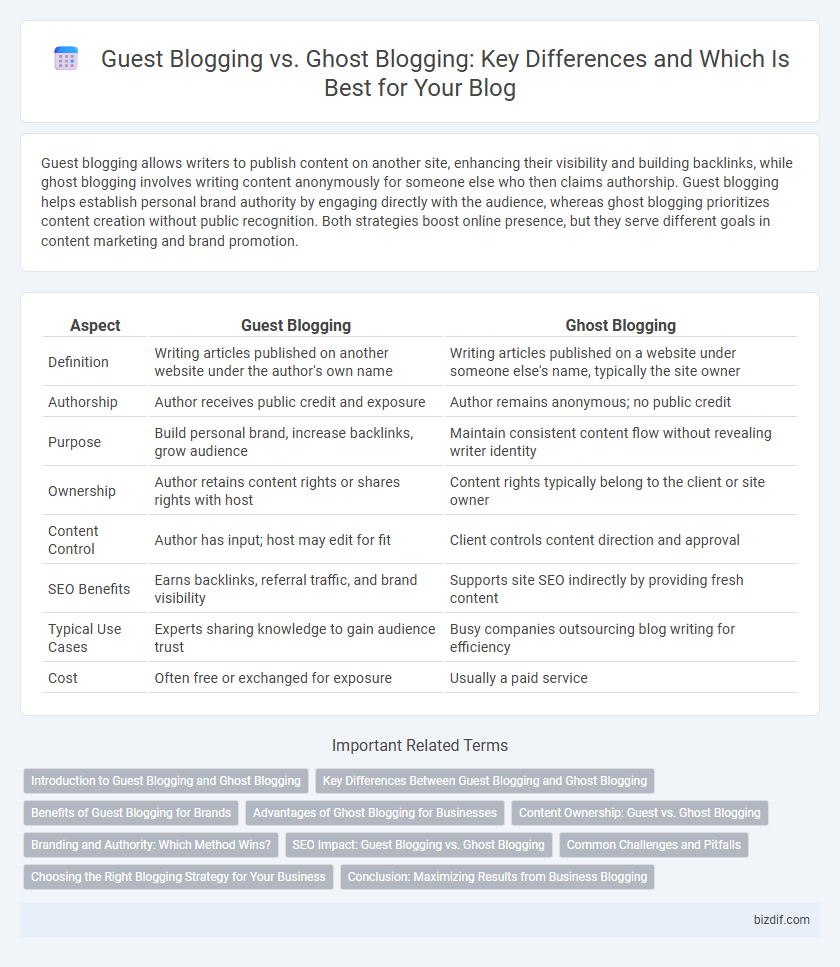Guest blogging allows writers to publish content on another site, enhancing their visibility and building backlinks, while ghost blogging involves writing content anonymously for someone else who then claims authorship. Guest blogging helps establish personal brand authority by engaging directly with the audience, whereas ghost blogging prioritizes content creation without public recognition. Both strategies boost online presence, but they serve different goals in content marketing and brand promotion.
Table of Comparison
| Aspect | Guest Blogging | Ghost Blogging |
|---|---|---|
| Definition | Writing articles published on another website under the author's own name | Writing articles published on a website under someone else's name, typically the site owner |
| Authorship | Author receives public credit and exposure | Author remains anonymous; no public credit |
| Purpose | Build personal brand, increase backlinks, grow audience | Maintain consistent content flow without revealing writer identity |
| Ownership | Author retains content rights or shares rights with host | Content rights typically belong to the client or site owner |
| Content Control | Author has input; host may edit for fit | Client controls content direction and approval |
| SEO Benefits | Earns backlinks, referral traffic, and brand visibility | Supports site SEO indirectly by providing fresh content |
| Typical Use Cases | Experts sharing knowledge to gain audience trust | Busy companies outsourcing blog writing for efficiency |
| Cost | Often free or exchanged for exposure | Usually a paid service |
Introduction to Guest Blogging and Ghost Blogging
Guest blogging involves contributing original content to another website's blog, allowing authors to reach new audiences while gaining backlinks and enhanced credibility. Ghost blogging entails writing posts on behalf of another person or brand, where the actual author remains anonymous and the credited individual takes ownership of the published content. Both strategies boost online presence but differ in visibility and attribution.
Key Differences Between Guest Blogging and Ghost Blogging
Guest blogging involves writing content published under the guest author's name on another website, enhancing visibility and establishing authority. Ghost blogging, by contrast, entails creating content credited to someone else, typically a business or individual, without public acknowledgment of the writer. Key differences include authorship recognition, control over content, and the audience's perception of credibility and voice authenticity.
Benefits of Guest Blogging for Brands
Guest blogging offers brands increased visibility by reaching new, targeted audiences through reputable third-party platforms. It enhances brand authority and credibility by associating content with established blogs within the industry. This method also generates high-quality backlinks, improving SEO performance and driving organic traffic to the brand's website.
Advantages of Ghost Blogging for Businesses
Ghost blogging allows businesses to maintain a consistent publishing schedule without dedicating internal resources, ensuring high-quality content from professional writers. It enhances brand authority by producing expertly crafted articles that align perfectly with the business's voice and marketing goals. This approach also frees up time for company leaders to focus on core operations while still benefiting from regular, SEO-optimized content that drives traffic and engagement.
Content Ownership: Guest vs. Ghost Blogging
Guest blogging allows writers to retain content ownership, often credited with byline and backlinks that enhance their authority and SEO value. Ghost blogging involves third-party writers producing content anonymously, where the hiring entity holds all rights and claims authorship, limiting the original writer's recognition. Ownership directly influences content control, intellectual property rights, and long-term brand building in both guest and ghost blogging scenarios.
Branding and Authority: Which Method Wins?
Guest blogging boosts branding by linking your name directly to quality content, enhancing authority through public recognition and backlinks from reputable sites. Ghost blogging elevates authority quietly by leveraging expert writers who align with your brand voice, allowing consistent content production without personal exposure. For robust brand-building and visible authority, guest blogging generally outperforms ghost blogging due to its transparent association with the content creator.
SEO Impact: Guest Blogging vs. Ghost Blogging
Guest blogging boosts SEO by generating high-quality backlinks and increasing domain authority through authentic content attributed to the guest author. Ghost blogging enhances SEO by maintaining consistent content output with professional writing, though it lacks direct author credibility and backlink benefits. Prioritizing guest blogging often yields better organic search rankings due to transparent authorship and stronger link-building opportunities.
Common Challenges and Pitfalls
Guest blogging and ghost blogging both face challenges like maintaining consistent voice and quality, but guest bloggers often struggle with limited control over content and deadlines imposed by the host site. Ghost bloggers encounter difficulties in capturing the authentic voice of the client while staying behind the scenes, risking misrepresentation or diluted brand identity. Both approaches require clear communication and alignment on expectations to avoid pitfalls such as content misalignment and loss of audience trust.
Choosing the Right Blogging Strategy for Your Business
Guest blogging enhances brand authority by allowing businesses to leverage established platforms and reach targeted audiences, while ghost blogging offers consistent, professionally crafted content without dedicating internal resources. Selecting the right blogging strategy depends on factors such as audience engagement goals, available time, content control preferences, and budget constraints. Balancing guest blogging's networking benefits with ghost blogging's efficiency can maximize visibility and establish thought leadership in competitive markets.
Conclusion: Maximizing Results from Business Blogging
Guest blogging boosts brand authority and expands reach by leveraging established audiences, while ghost blogging ensures consistent, professional content without demanding significant time investment. Combining guest and ghost blogging strategies maximizes SEO impact, drives targeted traffic, and strengthens thought leadership for business blogs. Prioritizing content quality, relevance, and strategic collaboration leads to the highest ROI in business blogging efforts.
Guest Blogging vs Ghost Blogging Infographic

 bizdif.com
bizdif.com